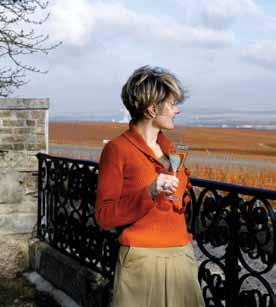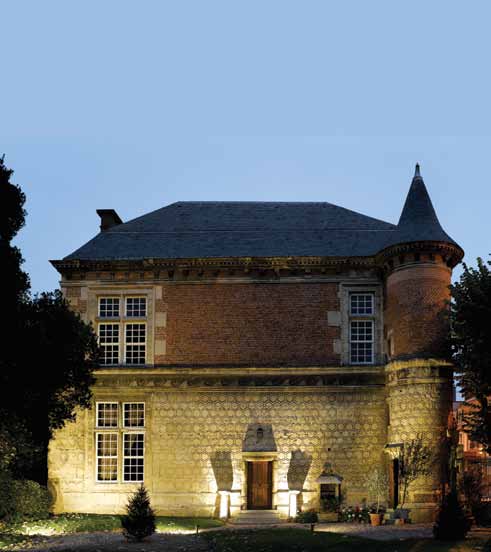The New Grande Dame
At the helm of renowned French champagne house Veuve Clicquot is another assertive woman
No other brand of Champagne is more closely identified with a woman than Veuve Clicquot.
The house was founded by Philippe Clicquot in 1772, then later passed to his son, Francois, who died prematurely in 1805. Francois’ young widow then made the unheard-of decision to run the family business herself. Over the next 60-plus years, under the direction of “the Widow Clicquot,” the Veuve Clicquot empire became one of the most respected and recognizable Champagne labels in the world. Today, history is repeating itself. Since 2001, the president and CEO of Veuve Clicquot has been yet another remarkable, strong, savvy businesswoman, who much like the original Madame Clicquot, is obsessed with excellence and notes that her priorities are caring for people and leading a happy life. New Orleans Living recently caught up with Veuve Clicquot’s current grande dame, Cecile Bonnefond, for a glimpse behind the infamous Yellow Label.
As president and CEO of Veuve Clicquot, what are your main responsibilities?
My responsibility is to develop the House of Veuve Clicquot all over the world, thanks to a collection of beautiful Champagnes, with the Clicquot unique taste and the best quality [“only one quality, the finest” is, by no surprise, the motto of the house]. In addition, to build a superb appreciation by the consumers, of the Veuve Clicquot name as the lifestyle Champagne label: very innovative, very edgy, still very smart and elegant.
as the lifestyle Champagne label: very innovative, very edgy, still very smart and elegant.
You are the first woman to run Veuve Clicquot since the widow Madame Clicquot created the brand 150 years ago. Has that added to the pressure of the position?
Barbe-Nicole Ponsardin Veuve, [the Widow Veuve] was only 27 years old when she decided against all odds to take over the business after the death of her husband. Remember that women could not vote or even have a bank account back then! But the law allowed a widow—and a widow only—to look after her family’s interest and safeguard her business. And for the 60 or so following years, she not only presided over the destiny of Veuve Clicquot, but also invented a business model that still prevails today in Champagne. To go back to your question, I really don’t feel more pressure because I am the second woman. You can look at it, as I do, in another way: There have been only 10 presidents at the helm of Veuve Clicquot in almost 240 years, of which two have been women. Twenty percent is not a bad ratio for parity at the top, compared to most corporations, even the most advanced ones. Seriously, the position certainly puts a lot of responsibility on me. I am proud to be running Veuve Clicquot and am inspired by her namesake.
What characteristics do you feel you share with Madame Clicquot?
Probably the determination to move forward, whatever the circumstances. Resilience has been one of her great qualities. Thanks to her obsession for excellence in everything; we owe the exceptional quality of our wines to the fact that Madame Clicquot bought some of the best Champagne vineyards and put in writing all of her blending secrets, so that today we can enjoy highly rated wines. I would like to be perceived as sharing her amazing drive, ambitious vision and obsession for excellence in everything we do.
Do you see more women getting into high-profile positions in the wine industry?
There have always been women at the head of the most prestigious Champagne houses, even if Madame Clicquot is the most famous. As a woman, I have always felt totally legitimate to run Veuve Clicquot, both amongst my peers in Champagne and when I travel the world to promote our art de vivre.
What advice would you give young women who desire a career in the wine and/or spirit industry?
You are going to be successful if, in addition to regular business skills, you are passionate about the product, if you are interested in gastronomy, lifestyle, trends and in addition, you have that personal je ne sais quoi that makes the difference.
Veuve Clicquot is highly supportive of businesswomen and in fact has created an award to honor stand out female professionals. What was the motivation to do so and what is it awarded for?
In 1972, to celebrate the bicentenary of the House of Veuve Clicquot Ponsardin, we created the Veuve Clicquot Businesswoman Award, first in France, then in the U.K. After 37 years, it is now awarded in 17 countries, and we have a quorum of over 250 past winners, with various high-profile professionals of all the areas of the business life. We celebrate entrepreneurship, vision, determination and audacity, and of course profits! All values boasted by Madame Clicquot. Since 2007, we have added one mandatory criteria, that being corporate social responsibility.
Speaking of corporate social responsibility, you are a tremendous support of this concept. Why do you feel it is important for corporations to be held socially responsible and what steps has Veuve Clicquot taken to make the company more socially responsible?
Clicquot taken to make the company more socially responsible?
You are right, social responsibility is a key driver. One example is the impact of our activity on the environment, and we have taken several measures to improve our situation: ISO certifications in viticulture and production, reduction of our water consumption by 50 percent over the past five years, reduction to the minimum of the use of pesticides, monitoring of our carbon footprint. We are also renovating our Reims mansion, where we entertain our clients and friends, using 100 percent renewable energies like solar energy, geothermy. And for a house that was built in 1840, I can tell you that it is not an easy task. But social responsibility goes much further with suppliers’ compliance, responsible drinking initiatives and initiatives towards women.
What are the biggest changes you’ve implemented during the past seven years as CEO of Veuve Clicquot?
First, I like to focus on what we want to keep, that is, our culture as a relatively small, reactive and intuitive Champagne house, combined with our reputation of an international luxury name. The areas on which I have put special emphasis are wine expertise, edgy innovation, design as a signature and sustainable development as a requirement.
The United States consumes more Veuve Clicquot than any other market. To what do you attribute the brand’s incredible success in the States?
Since our first shipment to Philadelphia in 1782, the United States has always been considered a key destination for our house. It is currently by far our first market, and Yellow Label is the number one Champagne in the USA. Americans absolutely love the unique taste of our Champagne, and they are attracted by the reputation and the elegant, trendy style of Veuve Clicquot. Offering Veuve Clicquot is a symbol of quality appreciation and savoir vivre.
How much Champagne is produced today at Veuve Clicquot? And how many different labels?
Our flagship Yellow Label is the best known label of our house. In 2006, we launched Veuve Clicquot Rosé, our rosé version of Yellow Label, internationally and it has been enjoying great success. Veuve Clicquot was the first Champagne house to introduce vintages in 1810, and we have three different vintage types: blanc, rosé and rich. The prestigious collection of vintages goes from the most recently launched—2002—to rare and extra-rare years, like 1985 or 1988, which are both available in the U.S. La Grande Dame is our cuvee de prestige, which is a blend of our eight best Grand Crus, in blanc and rosé. The number of bottles we produce is our best-kept secret. I like to say that we are a small house with an immense reputation!
What can we expect to see from Veuve Clicquot in the future?
I can promise there will be no change in the obsession for wine excellence. It is at the core of our reputation. As you well know, we have a culture of innovation through design. In the past years, we have developed initiatives with prominent designers such as Karim Rashid, Andrée Putman, Pablo Reinoso, Christophe Pillet, Porsche Design Studio. We will have more to come in the very near future! The next “hot date and place” is the Milan Design Week, at the end of April 2009, where we will reveal our newest creations!
Veuve Clicquot is surely one of the most recognizable Champagne brands made. To what do you attribute the brand’s success?
Certainly first and foremost the style and taste of our wines! Veuve Clicquot boasts a distinctive pinot noir signature (like the best red Burgundy wines), both powerful and elegant. Then, our distinctive yellow color (yes, we call it yellow, like the sun, a label that was invented over 130 years ago!) is a symbol of high standards, superb lifestyle and a must-have for a chic party.
How do you think the current economic situation will affect luxury brands such as Veuve Clicquot?
I am confident for Veuve Clicquot. This is not the first economic challenge since 1772 and Veuve Clicquot has survived all of them, even exiting stronger.
What is your favorite wine and why?
It really depends on the occasion. The real luxury is to have a fresh and radiating flute of Veuve Clicquot Yellow Label during a sunny brunch, open a magnum of vintage during a dinner with gourmet friends or offer a bottle of Grande Dame to celebrate the birth of a little girl, a future grande dame….
